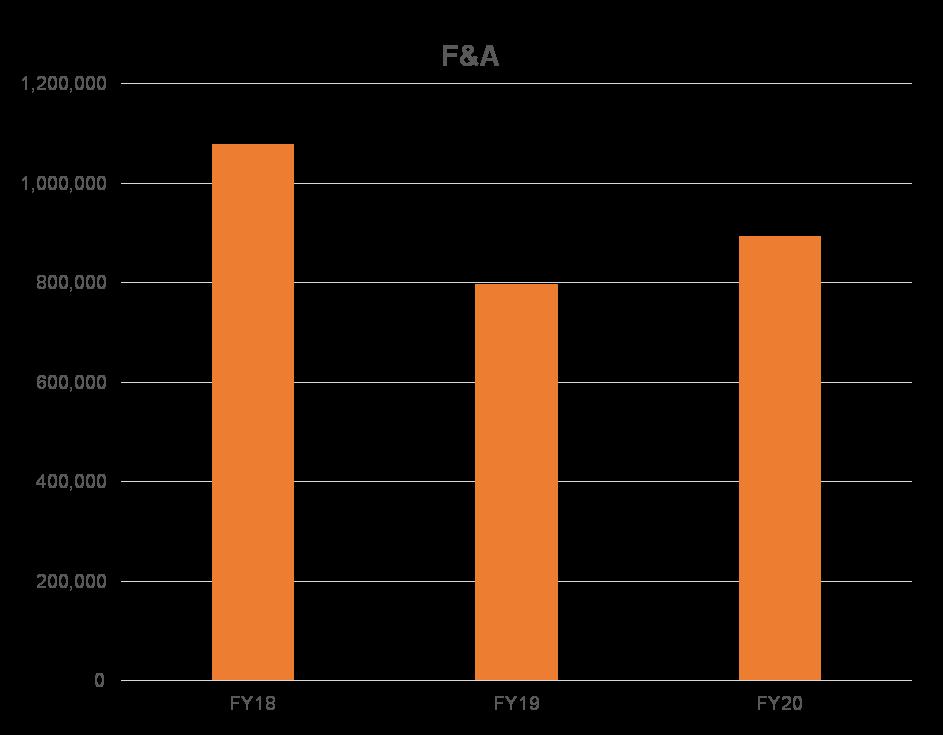
Center on Alcohol, Substance use, And Addictions (CASAA)
J. Scott Tonigan, PhD
2020 Annual Review of Category 3 Research Centers/Institutes | 2-15-21
Note: Oct 2020, Center name change formally approved by UNM Provost Holloway
Review of Category 3 Research Centers/Institutes 1
Annual
*

Mission
•CASAA exists to conduct high quality scientific research to advance knowledge necessary to improve prevention and treatment, and to reduce suffering related to substance use and other addictive behaviors.
•Research at CASAA focuses on problems of social importance.
•CASAA investigators maintain the highest standards of scientific integrity and are committed to integrating issues of human diversity into their research.
•CASAA values transdisciplinary approaches to research problems, and sharing of research products with the larger scientific community.
•CASAA also works to facilitate the translation of empirical knowledge into real world applications that will improve the quality of life, not only in the State of New Mexico, but also in other states and nations.
•CASAA serves as a platform and wheel house for the Substance Use Grand Challenge Initiative at UNM.
Annual Review of Category 3 Research Centers/Institutes 2

CY 2020 Goals and Status
Goal: Maintain a high profile as a world-class research center in the national/international scientific communities, in the New Mexico Community, and within UNM.
Status: Five faculty served as members/chairs of NIH grant review committees, CASAA sponsored one virtual national conference, faculty, staff and students published in high quality scientific journals, faculty served on UNM IRB, COI, and executive search committees, 1 presentation to NM legislative council.
Goal: Serve as a center for scientific and applied training in the addictions field
Status: (1) Successful continuation of the NIH Institutional Research Training grant supporting 7 pre- and 4 post-doctoral trainees, and training opportunities for ~41 students, (2) Supported a majority of the Grand Challenge funded pilot studies, (3) mentoring of main campus faculty in generation of NIH applications through grant writing seminar, and (4) successfully transitioned NIH awards to virtual format in response to pandemic.
Goal: Have a cadre of investigators pursuing their own individual lines of research
Status: Continued externally funded research in: mutual support, opiate use among incarcerated adults and American Indians, clinical trials of new interventions, mechanisms of behavior change, and college-based prevention programs.
Goal: Conducted national search for CASAA director hire.
Status: Three qualified finalists with national reputations recruited and interviewed. Failed search.
Goal: Have at least 10-12 investigators at different career levels
Status: Maintained size of core group of principal investigators, acquired GC funding for open rank research faculty hire and search initiated, promoted Dr. Pearson to Research Associate Professor. Dr. Tim Condon, senior investigator, retired. Dr. Painter-Davis (UNM Sociology) recruited as PI responsible for Dr. Condon’s award.
Goal: Have an effective administrative organization to support the mission and goals of CASAA
Status: Consolidated and refined the CASAA re-organization into three units: Grant management (pre and post award), HR and Facility management, and Program Evaluation Services. Posted and hired Senior Business Manager.
Annual Review of Category 3 Research Centers/Institutes 3

Membership of Advisory Committee
Mark Peceny, Dean College of Arts and Sciences
Daniel Savage, Regents' Professor, Department of Neurosciences (Chair)
Jane Ellen Smith, Professor Psychology
Michael Dougher, Professor Emeritus, Psychology
Jay Parkes, Professor of Educational Psychology
• In CY20, the advisory committee did not meet, formally. Interactions with advisory committee members occurred on an individual ad hoc basis, as needed.
Annual Review of Category 3 Research Centers/Institutes 4

CY 2020 Highlights
CASAA Director. Dr. J. Scott Tonigan is a senior investigator with a 32-year tenure at CASAA and he served as interim director for the previous 2 years. Dr. Tonigan accepted the role of director after the failed director search.
Pandemic Response. Pursuant to the NM Public Health Order and UNM policy CASAA paused all face-to-face research activities (funded and unfunded) March 12, 2020. We successfully transitioned all Tier 3 staff and faculty to remote work. Implementation of UNM COVID-19-safe practices, re-configuration of CASAA facilities, and acquisition of PPE led to re-opening CASAA on a limited basis for human subject research July 2020. All funded project’s are now operational, with many adopting hybrid face-to-face and virtual formats approved by the OVPR, IRB, and NIH.
Major Awards. Three CASAA post doctoral fellows (Drs. Hurlocker, Schwebel, and Hirchak) and CASAA faculty mentor, Dr. Pearson, awarded the prestigious, Slobada and Bukoski Cup, Society for Prevention Research. Dr. Venner was awarded the Dora Goldstein Diversity in Sciences Award, Research Society on Alcoholism.
Faculty Accolades. Dr. Katie Witkiewitz accepted role as senior editor of Psychology of Addictive Behavior. Dr. Margo Hurlocker accepted assistant professor (tenure line) in UNM Department of Psychology. Dr. Matthew Pearson promoted to CASAA research associate professor. Post doctoral fellow, Dr. Hirchak, accepted research assistant professorship, Washington State University.
Publicity. CASAA programs and investigators were featured ~11 times in UNM news releases in CY20. In cooperation with the UNM Office of Government and Community Relations successfully inserted the need for substance use research in rural communities in the federal priorities book.
Annual Review of Category 3 Research Centers/Institutes 5

Annual Review of Category 3 Research Centers/Institutes
0 5,000,000 10,000,000 15,000,000 20,000,000 25,000,000 30,000,000 35,000,000 FY18 FY19 FY20 Proposals 1,550,000 2,050,000 2,550,000 3,050,000 3,550,000 4,050,000 4,550,000 5,050,000 5,550,000 FY18 FY19 FY20 Awards
Proposals & Awards

Research Expenditures and F&A
Research Expenditures

Annual Review of Category 3 Research Centers/Institutes 7
0 1,000,000 2,000,000 3,000,000 4,000,000 5,000,000 6,000,000 FY18 FY19 FY20











Annual Review of Category 3 Research Centers/Institutes 8 0% Salaries, 413,785 , 47% Fringe Benefits, 61,711 , 7% Materials & Supplies, 101,765 , 12% Rent, 292,953 , 34%
F&A Return $ 569,661 VPR Pullback $ (28,205) I&G (COSAP) $ 108,668 Student Fees $ 9,000 Gifts $ 542 Other $ 32,725 Grand Challenge $ 54,800 Support from OVPR $ 334,568 FY20 Reserves $ 483,325 Total Revenue $ 1,565,084
CASAA EXPENDITURE DETAILS FY20 Sources of Revenue

Research Center Impacts
Resources provided for the campus
-- CASAA faculty, chair for Vice President of Research Search Committee
CASAA main campus satellite program, Campus of Office Substance abuse Prevention (COSAP), provided campus-wide alcohol, tobacco, and drug prevention programs.
-- Faculty Service on main campus Conflict of Interest (COI) and IT UNM Committees, UNM Arts & Sciences Regents' Professor Selection Committee, 2020
-- Mentoring, training, and resources to support and add momentum to non-CASAA faculty NIH grant writing
-- Mentoring and training of ~52 undergraduate, graduate, and postdoctoral fellows.
Outreach efforts supporting the Grand Challenge
-- Plenary talks at the National Gaming Resource Conference and MITC training Program (Albuquerque).
Collaborate, support and submit COVID-19 rapid response applications (2 awarded to CASAA investigators)
-- Collaborate and support development of manual guided interventions for American Indian adults with opiate disorders
-- Funded initiatives to facilitate transition from incarceration to community for opiate use disordered adults
Contributions to education and intellectual environment: Courses and seminars
-- Virtual-based 8-week NIH grant writing seminar offered free of charge to university faculty and students (53 registered, 43 attended first session, 24 completed all 8 sessions)
-- Fall and spring Addiction seminar open to psychology pre-doctoral students and post-doctoral fellows
-- Faculty labs included mentoring/support of undergraduate research
-- In partnership with the OVPR, CASAA hosted a guest lecture series that was open to the university community
•Center serves as a resource for the state/region
Two presentations to the NM Legislative Council Behavioral Health Subcommittee (Drs. McCrady & Sanjuan)
-- Direct funded work with community treatment providers to develop better ways to treat substance use disorders
-- CASAA website with freely available assessment tools used for substance use prevention and treatment
-- Coding and training tapes available to improve evidence-based provider interventions
Annual Review of Category 3 Research Centers/Institutes 9

Return on Investment
Grants & Contracts
CASAA investigators submitted 27 grant applications: 22 NIH applications (5 R01, 4 R34, 2 R21, 1 UG3/UH3, 1 R01 diversity supplement, 3 K23, 1 K01, 1 F32, and 4 F31) and 5 submissions to the state and SAMHSA.
CASAA received 6 new NIH awards and sub awards* (1 R01, 2, R21. 1 R34*, 1 R61*, and 1 UG1*) and had a total of 30 active awards this year. Total (direct and indirect) = $ 4,122,321 M.
Publications & Conference Presentations
CASAA investigators authored or co-authored 149 peer-reviewed papers, 128 unique papers.
Publications were in high and mid-impact journals including, but not limited to, Addiction, Journal of Consulting and Clinical Psychology, Psychology of Addictive Behaviors, Journal of Substance abuse Treatment.
CASAA investigators made 23 in-person and virtual presentations at international, national, regional, and local conferences.
Students
Fifty-two undergraduate, graduate, and post doctoral fellows received research training by CASAA investigators.13 undergraduate students supervised in research labs, 28 graduate students conducted research, were in CASAA labs, attended CASAA training webinar, and/or supported funded research, 7 pre-doctoral students and 4 Post doctoral fellows in T-32 training program.
Annual Review of Category 3 Research Centers/Institutes 10

Nationally and internationally recognized Center for dissemination, training, and research on addiction prevention and treatment.
Productive and responsive platform and resource for UNM Grand Challenge initiative.
CASAA re-organization improved efficiency and quality of infrastructure services to CASAA investigators and UNM.
Excellent mentoring program with graduate students and post-doctoral fellows who are successful in addiction research, dissemination, and acquisition of NIH funding.
Strong and positive NIH funded partnerships with HSC and Mind Research Network investigators.
Financial burden of having to pay full costs for building, security, and telephones.
Limited funds for pilot studies, lack of incentive plan to support NIH submissions.
Insufficient reputation as the resource for addictions information within New Mexico
Need for stable and equitable F&A sharing MOU between CASAA and HSC.
Off-campus CASAA location limits collaborations between CASAA and main campus investigators
Retention of investigators; retirement of senior investigators and financially bridging prospective and new investigators.
Continue to serve as a primary platform for the Substance Use Grand Challenge.
Expand and refine virtual NIH grant trainings and sustain virtual communication platform to reduce CASAA facility square footage needs.
Respond to NIH RFA’s for larger center grants, e.g.,P50 and U01.
Capitalize on new federal priorities to increase substance use research in rural communities with demonstrated health disparities.
Expand collaborations with the Mind Research Network and UNM HSC.
Expand and enhance mobile device research to respond to New Mexico health disparities and social problems associated with the pandemic.
Potential loss of junior research faculty when they cannot obtain sufficient grant funding to support their salaries
Attrition of senior investigators to mentor postdoctoral fellows and new investigators.
High fixed expenses (e.g., lease) pose serious threat to fiscal stability of CASAA.
Absence of dedicated tenure-line faculty positions for CASAA.
Need for timely F&A distributions from HSC to CASAA.
WEAKNESSES STRENGTHS OPPORTUNITIES
THREATS
Annual Review of Category 3 Research Centers/Institutes
11

Looking Ahead to 2021
Further enhance our high profile as a world-class research center and resource in the national/international scientific community, in the greater NM community, and within UNM. Continue to support Grand Challenge Substance Use Disorders Initiative through CASAA on-going and planned programs, (e.g., virtual grant writing trainings and pre and post award services to GC investigators), faculty continue to serve as members of grant review committees, continue CASAA lecture series in virtual format, and faculty continue to publish in high quality scientific journals. Deepen and expand CASAA partnerships with treatment providers and policy makers in NM.
Address recruitment of principal investigators to CASAA in order to have a full cadre of investigators pursuing their own individual lines of research, with an emphasis on increasing our rate of NIH submissions. Related, pursue NIH mechanisms that solicit larger center grant applications. We will interview and, ideally, hire an open rank research faculty position at CASAA funded through the Substance Use Grand Challenge. Additional prospective UNM investigators will be cultivated via the CASAA virtual grant writing seminar which was highly successful in recruitment and retention of faculty participants relative to past in-person trainings. To increase this possibility, we are planning an advanced grant writing 102 seminar, intended to target and mentor those faculty interested in applying skills learned in the first seminar to the actual preparation and submission of an NIH application. Effort will also be placed on the submission of NIH diversity supplements to recruit and mentor prospective minority investigators. Last, CASAA investigators (Drs. Pearson & Witkiewitz) are preparing a center grant application (due March 19, 2021) focusing on the integration of pain and opioid treatment,RFA-DA-21-030.
Address the challenge of covering CASAA lease expense. CASAA is fully responsible for the expense of leasing our offcampus facility, and this responsibility accounts for 34% of the centers annual expenditures. Thus, we will continue to coordinate with UNM units responsible for leasing, developing and acquiring property to define options for securing a facility that supports the CASAA mission. Alternatively, CASAA initiated negotiations with UNMH in 2020 to lease one of CASAA’s two floors to offset expenses (UNMH decision expected April, 2021). This alternative has become increasingly attractive because remote work and virtual research platforms implemented in response to the pandemic has demonstrated that a reduction in CASAA space will not adversely impact CASAA activities or mission.
Annual Review of Category 3 Research Centers/Institutes 12

Summary
• CASAA has been highly successful this year in adapting to the public health demands of COVID-19. Transitioning to remote work and to a virtual format in many studies minimized the interruption of, and impact on, funded and unfunded research.
• CASAA is a critical resource for the Substance Use Grand Challenge, UNM, NM, and the nation, given the harm that alcohol and drug use can create for individuals, their families, and the community.
• CASAA accomplished its mission to conduct meaningful research, disseminate findings, educate students, and to provide service to UNM.
Annual Review of Category 3 Research Centers/Institutes 13








